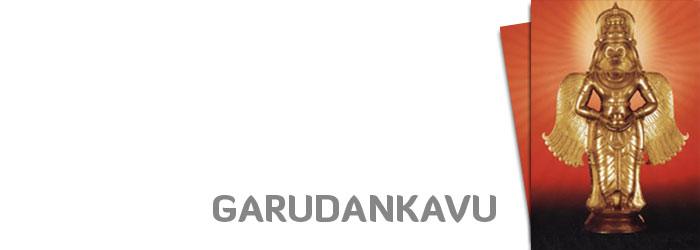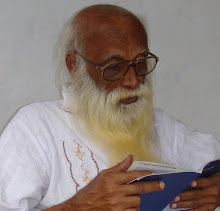Garudan Kavu official website
Sunday, May 10, 2015
THE ENEMY OF YOUR ENEMY IS YOUR FRIEND
Garudan Kavu official website
Saturday, April 19, 2014
AN UNUSUAL LOVE STORY
Monday, December 30, 2013
man, woman, moksha
Friday, December 27, 2013
brhaspati, his loves and woes
 |
| Brhaspati & wife Tara |
 |
| Chandra - Moon god |
Saturday, March 22, 2008
APSARA - COURTESANS OF GODS
Kesini
Manorama
Menaka
Misrakesi
Rakshita
Rambha
Tilottama
Urvasi
Vidyutparna
Except for Urvasi and Menaka, the rest were the daughters of Kasyapa by one of his wives, viz., Arishta. They were thus Indra’s half-sisters.They were all very beautiful, and accomplished themselves as great danseuses. Urvasi was born under peculiar circumstances: Two ascetics, Nara and Narayana, were doing great penance in the Himalaya at Badarinath. Indra suspected that they wanted to usurp his place as Lord. He presented himself before them and offered whatever boon they wanted. They were so deep in meditation that they did not notice him. Indra then sent all his Apsara courtesans to sing and dance before them, so that they would desire one or more of them. Disturbed at length, sage Narayana slapped his thigh in annoyance; at once, there arose from it a maiden more beautiful and luscious than any of Indra’s gang. She was called Urvasi, because she was born out of a thigh (Uuru, in Sanskrit). Indra and his gang were discomfited; Narayana presented the newly created beauty to Indra, and sent them all off, back to Heaven. Only she has been specifically mentioned by name in Rg Veda (X, 95). Even though she was less accomplished as a singer and a danseuse than some of the others, she was the most charming of them all.
The myths are not specific about Menaka’s origins. According to some, she was a gift of the sea, when it was churned for nectar. But according to others, Menaka was already in Indra’s court, when Durvasas made his famous visit. She presented the sage with the fragrant garland of flowers, which in turn he gave to Indra. Indra had negligently placed it on the head of his elephant, which tossed it down and trampled it, thus enraging the sage to curse them all. The churning of the ocean was the means the gods took in order to get the means for restoring them to everlasting youth.
A type of god known as Gandharva, minstrels and musicians, were the usual companions of these divine courtesans. Sometimes, their union begat progeny. Some Apsara damsels fortuitously had fertile liaisons with humans, the progeny being left behind on Earth, where they became distinguished in many ways. Indra used them mainly for seducing ascetics whom he suspected to be capable of being his rivals. He would send them to sing and dance before them, so that they would lose their self-control and forfeit the virtues of their penances.
Apsara found favour in the Cambodia and other eastern countries. In the great temple at Angkor Vat, there are many depictions of them. The classic dance of Cambodia and Bali feature Apsara dances as one of the most popular items.
ASWINI - TWIN GODS OF HEALTH
Sathyan and Dasran were twin sons of Sun god Surya; they were the handsomest of all. Vedic hymns mention them as physicians of the gods. “Aswinii” means “of the horse”. They are praised for their beneficent attitude to humans. When sage Dirghasravas prayed for cessation of drought, Aswini caused sweet rain to shower. They helped sage Gautama slake his thirst by creating a spring in the desert.
Indra developed technology for brewing alcoholic liquor but entrusted it only to Dadyanga, threatening to behead him if he disclosed it. Aswini promised they would fit him out with a new head, and he revealed it. Indra beheaded him, but the twins kept their promise. They killed demon Vishwak, who was distressing humans. Because they practiced medicine including surgery, Indra decreed that they would not be entitled to share Soma juice offered in Yaga sacrifices.
In Puranas, their genealogy is from Vishnu through Brahma to Kasyapa who begat Surya through Aditi. One of Surya’s wives was Samjna, who, fatigued by his lovemaking, induced her maid Chhaaya (literally ‘shadow’) to substitute in her guise, and escaped to the forest. When Chhaaya abused Yama, another of Surya’s sons, her identity came out. Surya sought Samjna, and approached her disguised as a horse, disclosing his true form only when she was reconciled. Aswini were born and their association with the horse is mythically ‘explained’.
Their interaction with sage Chyavana is charming. This ascetic entered into such deep meditation that vegetation and anthills grew over him. Sukanya, daughter of King Saryati, chanced upon this copse. Intrigued by two points shining from within it, she poked them with a thorn – alas, they were the sage’s eyes; she, unwittingly, blinded him. The consequences were severe; rains ceased and famine loomed. Saryati discovered, through soothsayers, that the mishap was due to the hurt to the sage. He approached Chyavana, old, decrepit, now blind. The sage harboured no grouse, but sought a damsel to minister to him; only Sukanya volunteered. She was married to him, and faithfully served him, doing the most menial tasks.
Aswini, bewitched by Sukanya’s luscious beauty, approached. Loyal and dedicated to Chyavan, she spurned their advances. They offered to restore Chyavana to youth, in return for her as a fee. She refused, but reported it to the sage, who advised her to return and agree, subject to the condition that, if she recognized him after treatment, then they would forfeit the fee. They administered medicines; all three entered a pond. and emerged, looking identical. Because of her unfailing loyalty, she recognized her husband. Sportsmanlike, Aswini accepted their discomfiture. Chyavana offered to restore to them share in Soma sacrifices. Helped by his now delighted father-in-law, he arranged a sacrifice; all gods and sages were present. When the ritual reached the stage of offering Soma, he gave Aswini their share. Indra was incensed, but in the ensuing battle of words, Chyavana recounted Indra’s misdemeanours with wives of various sages, and how he fled to avoid defeat by various demons. Indra had to yield. Now, whenever Yaga is performed, Aswini get their share. Ayurvedic tonic, Chyavanaprasa, is the present version of the medicine believed to have been administered to Chyavana.
KUBERA - GOD OF WEALTH
Kubera, god of Wealth, was born of a lineage different from that of the other gods of heaven. Brahma the creator begat Pulasthya Prajapati, who begat Visravas. Visravas married Ilabila, the daughter of sage Bharadwaja, and begat Kubera. He married another wife, a demoness, and through her begat Ravana, Kumbhakarna and Vibhishana. He neglected this family, who survived in distress.
The gods placed Kubera in association with Varuna, who accommodated him in his oceans. But Kubera underwent penances, and Brahma the Creator blessed him with immense riches and the overlordship of the North. He then approached his father and requested him to build a capital and palace for him. Accordingly, Visravas had Lanka built on an island in the South, gifted him with a magic aerial ship, and a horde of semi-divine beings known as Yaksha and Gandharva. He was a great devotee of Siva, who, though wantless and ascetic Himself, gifted untold wealth on Kubera.
There is an amusing story of how Ganapati, the elephant-headed son of Siva, humbled Kubera. Seeing how poorly Siva and his family lived, Kubera thought he was doing them a great favour by inviting them for a sumptuous breakfast. Ganapati could not be satiated; he ate up all the food preparations in a jiffy, and wanted more. Kubera was baffled, and fled to Siva, who called his son back, and fed him with a pinch of the ashes that were Siva’s only cosmetic substances. Ganapati’s hunger was satiated.
Ravana, his half-brother, resented his father, Visravas’ neglect of his mother and his siblings. He and his brothers did great penance, and pleased Brahma the Creator, who granted them powerful blessings. Ravana then proceeded to drive his half-brother Kubera out of Lanka. Kubera fled north, and with the help of all the gods and sages, had another glorious capital, called Alaka, built for himself. There, he delighted in his treasure, and a court of beauties who rivalled even the court of Indra. Some of Indra’s courtesans used to be guests of honour in his court too. Siva was a frequent visitor, as were lesser gods. Kuberal was emboldened to send a messenger to Ravana, warning him to desist from harming the gods. Ravana was enraged; he set out to battle. On the way, he raped Rambha, who was going on an assignation to Kubera’s court. In the fierce battle that ensued, Kubera was decisively defeated. He fled, taking the disguise of a chameleon. Ravana looted Alaka and took away the aerial chariot, the jewels and the treasure, and several beautiful women. Kubera had to wait till the ultimate defeat and killing of Ravana by Rama, to get them back.
There are few temples dedicated to Kubera. He is iconically represented as armed with a mace, and riding on a buffalo.


